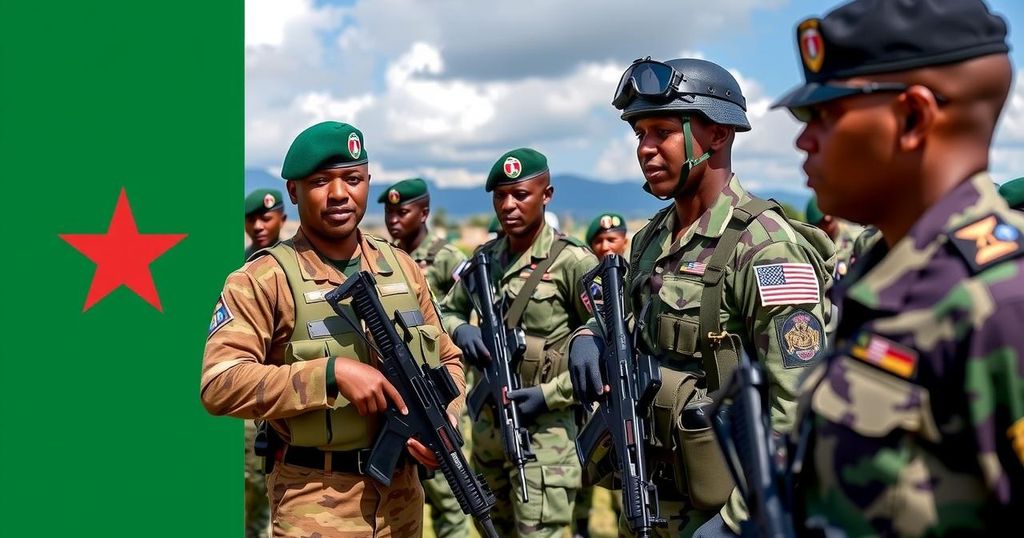The United States is escalating efforts to change the Kenya-led force in Haiti into a U.N. peacekeeping mission due to increasing gang violence, which has shut down flights in the capital. Currently under-resourced, the multinational force faces significant challenges and objections from Russia and China regarding the transition. With a rising gang influence and a mix of public sentiment towards foreign intervention, this situation is fraught with complexities and historical precedent.
The United States has intensified its efforts to convert the Kenya-led multinational force currently operating in Haiti into a United Nations peacekeeping force, prompted by a surge in gang violence that recently halted all air traffic to Port-au-Prince. In early September, the U.S. proposed this transformation as a means to secure ongoing funding for the U.N.-backed multinational force that is assisting Haiti’s national security forces in addressing the rampant gang-related issues. Following the rise in gang assaults, violence peaked this past Sunday after the interim prime minister was dismissed amid political discord within Haiti’s transitional council. According to the United Nations, gangs now control an estimated 85% of the capital, which led to the closing of Haiti’s main airport due to shooting incidents involving planes, resulting in injuries to a flight attendant. The United States is seeking unanimous approval from the U.N. Security Council for a draft resolution to initiate the transformation of the Kenyan-led force. This resolution includes a request for U.N. Secretary-General António Guterres to commence necessary planning for the transition, a process expected to be prolonged. Notably, there have been objections from Russia and China, which have expressed reservations about shifting to a U.N.-led operation. Currently, the multinational force is anticipated to comprise 2,500 international police officers; however, only about 430 personnel have been deployed thus far. The head of the U.N. political mission in Haiti indicated that a contingent of 600 additional Kenyan personnel is slated to arrive in November. Despite some contributions to the U.N. trust fund designated for the multinational force, financial resources remain severely limited, threatening the effectiveness and deployment of forces intended to support the Haitian National Police. The U.N. reported total commitments of $85.3 million against a target of $96.8 million, with a significant funding gap still present to achieve the full operational capacity of the force. The escalating power of gangs in Haiti has intensified since the assassination of President Jovenel Moïse in 2021, leading to a surge in violence, including killings, kidnappings, and sexual assaults, triggering a response from civilian vigilante groups. While Haiti’s leadership has formally requested a U.N. peacekeeping force, public sentiment toward potential foreign military intervention remains mixed due to historical grievances related to past interventions.
The current situation in Haiti is characterized by growing instability and gang violence, significantly intensified following the assassination of former President Jovenel Moïse. The power of gangs has increased dramatically, leading to widespread chaos and violence that has severely affected daily life and governance. Historical context reveals that Haiti has a history of foreign military interventions, including multiple U.N. peacekeeping missions, some of which have faced severe criticism due to instances of misconduct and negative consequences for the Haitian population. This backdrop underscores the complexity of engaging in international peacekeeping efforts in Haiti, particularly in light of the recent political turmoil and the expressed concerns of both local citizens and international stakeholders.
In summary, the United States is actively pursuing the transformation of the Kenyan-led multinational force in Haiti into a U.N. peacekeeping operation due to the alarming rise in gang violence and instability. Despite significant funding challenges and geopolitical objections, this initiative aims to bolster the Haitian National Police’s capabilities to restore order in a nation grappling with profound social and political crises. The preservation of peace and security in Haiti remains a critical international concern, necessitating a careful and collaborative approach from the global community.
Original Source: www.usnews.com







